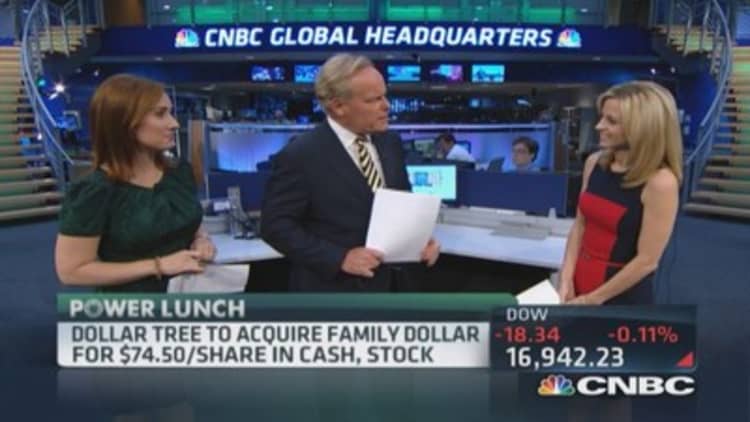While the discount retail giant created by Dollar Tree's acquisition of Family Dollar likely wouldn't spell doom for competitors, the combined company's offerings should, at least, keep them on their toes.
After Dollar Tree announced on Monday that it would purchase its rival discount retailer in an $8.5 billion deal expected to close by early 2015, analysts said the deal would cause Family Dollar stores to improve markedly—which may raise some concern for competitors.
"This must catch Dollar General and Wal-Mart's eye," said Laura Champine, managing director at Canaccord Genuity.
Family Dollar's more than 8,200 U.S. stores would account for the majority of the combined company's roughly 13,000 locations. The combined store volume would put the company ahead of rivals Dollar General and Wal-Mart, which have about 11,000 and 4,300 stores in the U.S., respectively.
Read MoreIcahn: Hopeful more potential buyers will surface for Family Dollar
Bryan Gildenberg, chief knowledge officer at Kantar Retail, said that Dollar Tree will likely "fine tune and re-calibrate" the Family Dollar brand, "more aggressively" closing locations and trimming operations in the first 12 to 18 months. The company could close "a few hundred" locations after the merger, Canaccord's Champine said.
A spokesman for Dollar Tree declined to comment on potential store closings.
"They're taking the store base and putting it in the hands of a company proven to be more reliable and has more investor credibility," Gildenberg said.

Analysts said the deal would also enable Dollar Tree to offer more competitive prices.
For example, the combined company could buy overlapping products in larger volume and, in turn, at a lower cost, said Brian Sozzi, CEO of Belus Capital Advisors. Though offerings and consumer demographics at the stores differ—Dollar Tree operates with fixed dollar-and-below prices, while Family Dollar's introduction of more name brand products has led prices to "creep up"—both sell more than 50 percent consumable goods, such as chips and cereal, Sozzi said.
Read MoreWho the monster dollar-store merger should scare
"[The merger] is more likely to take prices down than bring them up," Champine said.
If Dollar Tree successfully experiments with different price points and drives prices lower, it increases its chances of cutting into Dollar General's and Wal-Mart's market shares, analysts said.
Still, Kantar's Gildenberg noted that the merger may not spark a huge shift, as discount retailers such as Family Dollar have "been disruptive to Wal-Mart for a long time." That's because they are typically located closer to city centers, so they have stolen many of shoppers' mid-week spending.
Read MoreFamily Dollar profit falls by a third
But the sheer volume of stores would mark a shift in discount retail.
"Dollar General and Wal-Mart have to pay attention," Champine said.
Read MoreWhy Wal-Mart's new US head can right the business
Family Dollar shares jumped more than 20 percent after the announcement, while Dollar Tree shares rose slightly.
—By Jacob Pramuk, Special to CNBC.com.


